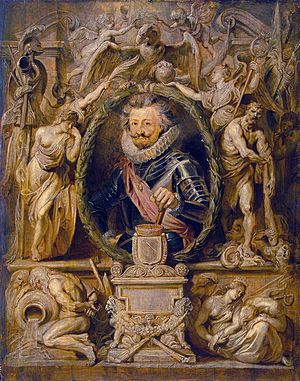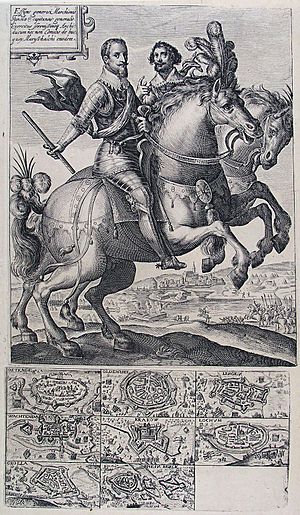Charles Bonaventure de Longueval, 2nd Count of Bucquoy facts for kids
Quick facts for kids
Charles I Bonaventure de Longueval
2nd Count of Bucquoy
|
|
|---|---|

Portrait by Peter Paul Rubens
|
|
| Born | 9 January 1571 Arras, County of Artois, Habsburg Netherlands |
| Died | 10 July 1621 (aged 50) Érsekújvár, Lower Hungary, Kingdom of Hungary |
| Allegiance | |
| Rank | Colonel (1597) General (1614) |
| Commands held | General of the Artillery of the Army of Flanders Commander-in-chief of the Imperial army |
| Battles/wars | |
| Awards | Order of the Golden Fleece (1613) |
| Spouse(s) | Maria Maddalena Biglia |
| Relations | Charles Albert (son) |
Charles Bonaventure de Longueval, 2nd Count of Bucquoy (born January 9, 1571, in Arras – died July 10, 1621, in Érsekújvár) was an important military leader. He fought for Habsburg Spain in the Eighty Years' War. Later, he led armies for the Holy Roman Empire during the Thirty Years' War.
Contents
Early Military Career in the Spanish Army
Charles Bonaventure de Longueval was born in Arras in 1571. His father was Maximilian de Longueval, the 1st Count of Bucquoy. Charles started his military career very young. He joined the Spanish forces in the Low Countries as a teenager. By the age of 26, he had already become a colonel.
He took part in several important battles:
- The Battle of Nieuwpoort in 1600.
- The Siege of Ostend from 1601 to 1604.
He was known for his skills as the General of the Artillery. This role meant he was in charge of cannons and other large weapons. He showed great talent during campaigns led by Ambrosio Spinola.
In 1606, he married Maria Maddalena Biglia. She was the daughter of a nobleman from Milan. In 1607, they had a son named Charles Albert.
In 1610, Bucquoy was sent to France as a special ambassador. His job was to share the sadness of Archdukes Albert and Isabella after the French king, Henry IV of France, was killed.
In 1613, he received a very special honor. He became a knight of the Order of the Golden Fleece. This was a highly respected award. That same year, he was also made the Grand Bailiff, or governor, of the County of Hainaut.
Leading the Imperial Army
In 1614, Charles Bucquoy traveled to Bohemia. He was there to represent Archduke Albert at an important meeting. Soon after, Emperor Matthias asked Bucquoy to lead the Imperial Army. He accepted this big role in August 1614.
In 1618, a major event happened in Prague. It was called the Second Defenestration of Prague. This event helped start the Bohemian Revolt. Bucquoy was on leave in the Habsburg Netherlands at the time. He quickly returned to Vienna to take command of the Imperial forces. His job was to stop the revolt.
His first military campaign was very challenging. His army lacked soldiers, supplies, and money. He faced a defeat by Count Jindřich Matyáš Thurn in the Battle of Lomnice. This happened on November 9, 1618. He could not save the town of Pilsen, which was under attack.
Despite these early difficulties, Bucquoy's luck changed in 1619. He received more soldiers from Archduke Albert. On June 10, he won a big victory against Ernst von Mansfeld in the Battle of Sablat. This win forced the Bohemians to stop their attack on Budweis.
Bucquoy also led the Imperial forces during the famous Battle of White Mountain. This battle took place on November 8, 1620. His successes in these battles were very important. Because of his victories, Emperor Ferdinand II gave him large estates. These included lands at Nové Hrady, Rožmberk, and Libějovice. His family owned these estates until 1945.
Death and Legacy
Charles Bucquoy was killed during a siege on July 10, 1621. He died while attacking the town of Érsekújvár (now Nové Zámky, Slovakia). One of his commanders, Torquato Conti, tried to get his body from the battlefield. However, Conti was captured. He was later released and took over Bucquoy's command.
Bucquoy's funeral was held with full military honors. It took place in the Franciscan Church, Vienna, on July 31, 1621.
See also
- In Spanish: Carlos Buenaventura de Longueval para niños
 | Audre Lorde |
 | John Berry Meachum |
 | Ferdinand Lee Barnett |


